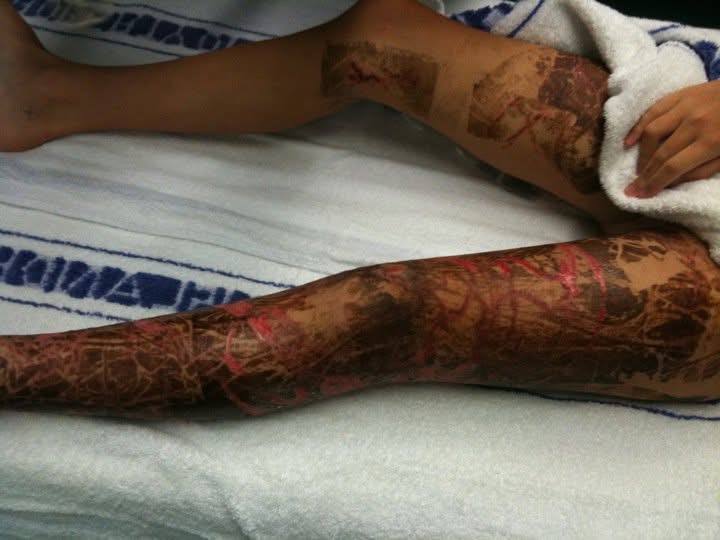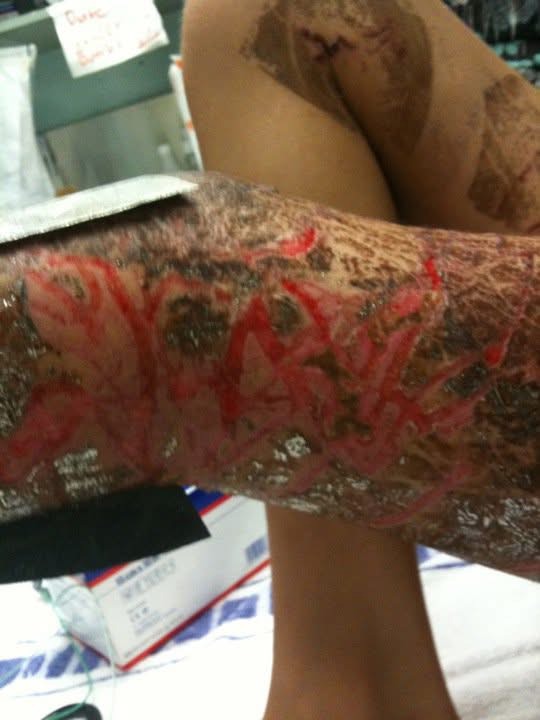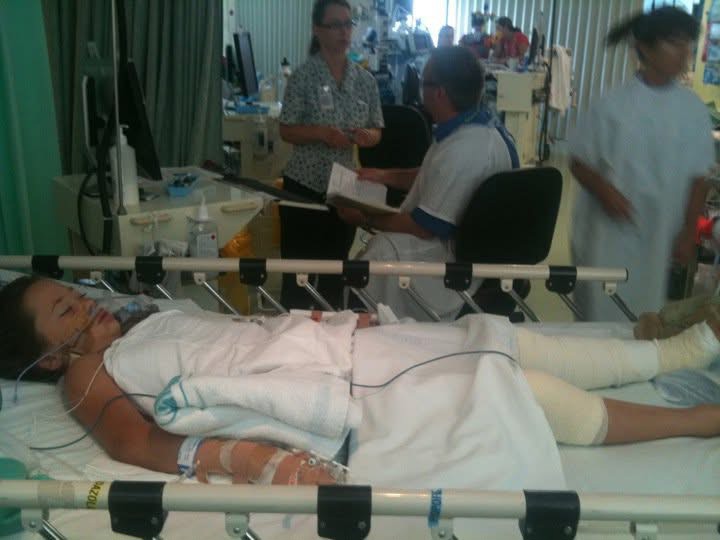Floods had washed away the stinger warning signs on the bank of the Calliope River when 10-year-old Rachael Shardlow waded into the shallows in December 2010.
She didn't want to be swimming in the estuary about 15km from Gladstone, Queensland, and had even thrown a tantrum before leaving the house with her parents and older brother Sam that day.
Perhaps it was an omen because minutes after entering the water, Rachael was stung by a deadly box jellyfish.
READ MORE: Fiji resort linked to suspected drink poisonings revealed

Found in warm waters from Western Australia to Queensland between October and May, box jellyfish are the most venomous marine creature on the planet and can kill a human in minutes.
Despite this, researchers still know next to nothing about the deadly creatures that almost claimed Rachael's life 14 years ago.
"I do remember being nervous about going in the water. I asked mum, 'is there anything in here that can hurt me?'" Rachael, now 24, told 9news.com.au.
Have you got a story? Contact reporter Maddison Leach at mleach@nine.com.au
Her mother told her she was safe but minutes later, Rachael's screams were "burned into" her mind forever.
Ruth Macklin and Geoff Shardlow, Rachael's parents, had been sitting on a nearby hill when she was stung and raced to the riverbank to find Sam dragging his convulsing sister out of the water.
A jellyfish had wrapped its tentacles around her entire left leg.
Campers drawn to the sounds of Rachael's screams rushed to help and immediately identified the creature as a box jellyfish. Someone called Triple Zero.
"Rachael was in my arms and she said to me, 'I can't see mummy. I can't see, I can't see.' And then she said, 'I can't breathe,'" Macklin said.
"And then she looked right in the eye and said, 'Am I going to die, mummy?'"
A heartbeat later, Rachael lost consciousness.


Fearing their daughter would die if they waited for an ambulance, Macklin and Geoff put her in the car and sped down the highway at 160km per hour to meet paramedics at a nearby crossroads.
Halfway through the drive, Rachael turned blue and Geoff immediately started CPR.
"That's the only reason she survived," Professor Jamie Seymour, a toxicologist specialising in venomous animals at James Cook University, told 9news.com.au.
Box jellyfish stings can cause paralysis and cardiac arrest so CPR is vital, but Seymour genuinely believed such a massive sting would kill the 10-year-old.
"My first impression was Rachael's not going to survive. She doesn't have a chance," he said.
READ MORE: Remaining Bali Nine members 'relieved and happy' to be back in Australia
Geoff and Macklin feared the same when they arrived at the Calliope Crossroads, where they'd been instructed to meet the ambulance.
They waited on the side of the road in the blistering sun for a handful of minutes. It felt like a lifetime.
"I remember a look between us like, 'we've lost her,'" Macklin said, "And then next thing, the ambulance turned up."

Rachael was given antivenom and raced Gladstone hospital, where she was placed into an induced coma before being flown to Brisbane for specialist care.
"I was trying to ask them, 'Is she going to live? What's going to happen?' And I remember them saying me, 'we don't know,'" Macklin said.
Rachael had tentacle contact to about 30 per cent of her body and her left leg was blackened and covered in raw, whip-like wounds.
READ MORE: 'It will be a nasty day': Victoria braces for fires amid extreme heat
Rachael was in a coma for two days after her sting and spent a month in hospital.
Though her survival was dubbed a "miracle", Seymour believes more people could survive severe box jellyfish stings with more research.
Today, the scars on Rachael's leg are barely visible and she's writing an autobiography titled Stung in the hopes more people can learn from her story.

Seymour believes the only reason she survived is because the box jellyfish that stung her was probably a juvenile and didn't deliver the full dose of venom an adult animal is capable of.
At least 70 people have died from box jellyfish stings in Australia since records began in the 1880s, yet researchers still know remarkably little about these deadly animals.
"No other venomous animal in the world kills humans as quickly as big box jellyfish and we know virtually nothing about them," Seymour said.
That makes it hard to treat and prevent stings and Seymour predicts the death toll will just keep rising unless federal and state governments invest more funding into researching these animals.
"We struggle, and have struggled for ages, to get money to do those sorts of things," he said, but funding is almost impossible to secure.
Seymour believes this is due to box jellyfish only appearing in Australia's northern waters and the lack of public education about the dangers of box jellyfish stings.
But every death serves as a stark reminder of why this research is necessary.
READ MORE: Nine Aussies flew to Bali in 2005. The final five are finally home
In 2022, 14-year-old Mark Angelo Ligmayo died after being stung by a box jellyfish at Eimeo beach, just north of Mackay.
"If that had been a shark, all hell would have broken loose. We'd have had funding left, right and center," Seymour said.
"I have no doubt it will happen again if we don't learn more about these animals."
He's pleading for more funding into box jellyfish research to prevent future deaths and improve treatment, especially as these animals are sighted further and further south.
Research has already shown that vinegar has the potential to cause harm when used in box jellyfish first aid and Seymour is desperate for more breakthroughs like that.
DOWNLOAD THE 9NEWS APP: Stay across all the latest in breaking news, sport, politics and the weather via our news app and get notifications sent straight to your smartphone. Available on the Apple App Store and Google Play.
